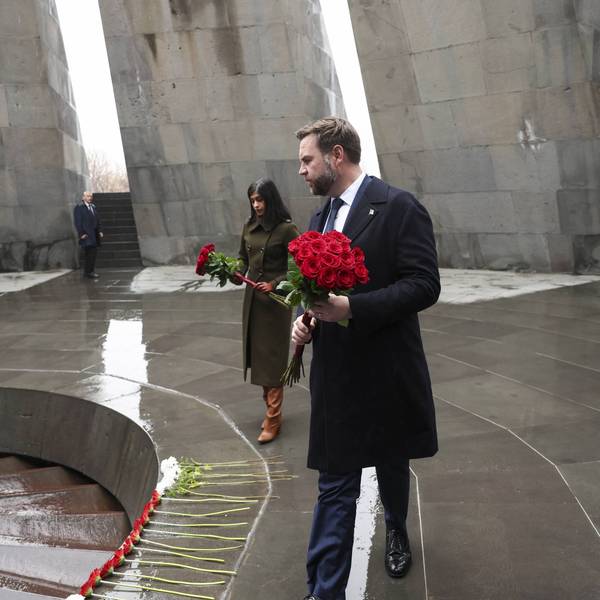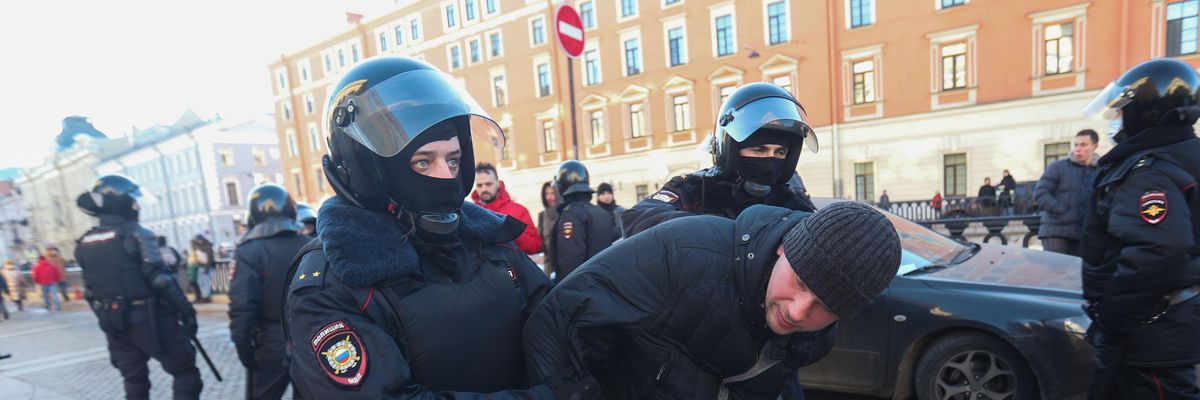Arthur L. Caplan, a professor of medical ethics at the NYU Grossman School of Medicine, has been campaigning for a program of mass death. He has written, not one, but two op-eds calling for a pharmaceutical boycott of Russia.
"How far does noncooperation with Russia go?" wrote Caplan on March 11 in Medscape. "Very, very far ... Whatever can be done to minimize harm to existing subjects in a short period of time ought to be done, but that is it. Similarly, no sale of medicines or therapies ought to be occurring, be they life-saving or consumer products." (Emphases mine.)
"The Russian people need to be pinched not only by the loss of cheeseburgers and boutique coffee but by products they use to maintain their well-being," Caplan lightheartedly adds.
The targeting of civilians is a relatively new form of barbarity in the history of war.
Caplan is untroubled by the implications of his proposal. "War is cruel that way," he shrugs, "but if you tolerate a government that is bombing and shelling a peaceful neighbor to oblivion, then pharma must ensure that efforts to make Putin and his kleptocratic goons feel the wrath of their fellow citizens."
In America the Vengeful, even the philosophers of health can preach death.
The fact that he's calling on private corporations to commit it doesn't change the moral equation: Caplan wants drug companies to take steps that result in civilian deaths--in a country that has already experienced 17,376,241 infections and 745,210 deaths from Covid-19.
His argument is based on two contradictory premises: that Vladimir Putin is a dictator, and that the Russian people must be punished for his actions. But if Russia is not a functioning democracy, how can its people be held morally accountable for their government's actions? The call to inflict pain and death upon Russian civilians is as illogical as it is monstrous.
It is also a war crime.
As any qualified ethicist should know, targeting civilians during a military conflict is a war crime. The Geneva Conventions (Additional Protocol I) are clear on the subject:
The civilian population as such, as well as individual civilians, shall not be the object of attack. Acts or threats of violence, the primary purpose of which is to spread terror among the civilian population, are prohibited.
Similarly, Common Article 3 of the Conventions prohibits "violence to life and person, in particular murder of all kinds, mutilation, cruel treatment, and torture" when perpetrated against persons "taking no active part in the hostilities."
And Article 48 of Protocol I calls on parties in conflict to "at all times distinguish between the civilian population and combatants" and "direct their operations only against military objectives."
As Human Rights Watch notes, "The rule of civilian immunity is one of 'the oldest fundamental maxims' of international customary law," one which applies to "non-state actors" as well as governments.
The targeting of civilians is a relatively new form of barbarity in the history of war. Before the start of World War II, British Prime Minister Neville Chamberlain said it was "against international law to bomb civilians as such and to make deliberate attacks on the civilian population."
For this reason, the Nazi bombardment of civilians in the Basque town of Guernica shocked and outraged the world--a world that has become sadly accustomed to the spectacle today. Picasso's painting of the tragedy was a call to make sure it didn't happen again.
That same year, the American State Department condemned the Japanese bombing of Chinese cities. "Any general bombing of an extensive area wherein there resides a large population engaged in peaceful pursuits is unwarranted and contrary to the principles of law and humanity," it declared. President Franklin Roosevelt called civilian bombing "inhuman barbarism."
The United States and Great Britain changed their actions during the course of the war, eventually targeting both German and Japanese cities. But the horrors of World War II gave rise to the Geneva Conventions, which updated and expanded earlier law to avoid future atrocities and attacks on civilian populations.
How far we've come. Seventy years later, even a medical ethicist can call for war crimes in the United States and avoid public censure.
Broad sanctions against civilians are an act of war and of violence--one that has been sanitized in the media but carries a body count all the same. Revised figures show that American sanctions against Saddam's Iraq resulted in the deaths of 227,000 children. As many as 40,000 people may have been killed by US sanctions in Venezuela, according to the Center for Economic and Policy Research (CEPR). And while Iran has not faced a Caplan-style pharmaceutical boycott, US sanctions indirectly affect drug supplies. They reportedly affected "more than six million patients suffering from complex diseases such as hemophilia, multiple sclerosis, thalassemia, epilepsy, and various immunological disorders, as well as transplant and kidney dialysis patients and those being treated for cancer."
Even a medical ethicist can call for war crimes in the United States and avoid public censure.
That, and worse, is what Caplan wants for Russian civilians.
Medical ethics, the field Caplan teaches, operates on four generally-accepted principles. Which one was Caplan drawing upon for his encomium to death? "Autonomy," which tells us that patients have the right to determine their own healthcare? "Justice," which declares that the benefits and burden of medical care be justly distributed? Or "nonmalfeasance," which calls on practitioners to ensure they are causing no harm?
Caplan is, of course, not the only American demanding collective punishment for the people of Russia. Rep. Eric Swalwell, a California Democrat, called for "kicking every Russian student out of the United States." Facebook is lifting its ban on incitements to murder for phrases like "Death to the Russian invaders," which it insists applies to soldiers but is broad enough to include civilians. Vandals have attacked Russian restaurants whose owners oppose the war. They're banning Russian athletes and performers. They're even banning Tchaikovsky, whose death in 1893 makes it inconvenient for him to express his wrath toward Putin.
Bob Dylan once told an interviewer why his apocalyptic nuclear war song, "A Hard Rain's Gonna Fall," had so many verses. With destruction so close at hand, he said, he wanted to use all the images in his notebooks before time ran out. It's starting to feel that way again. The poet, the painter, the musicians of this world better say what they have to say before it's too late. A society approaches spiritual death, and perhaps physical catastrophe, when its teachers of ethics preach the murder of the innocent.




